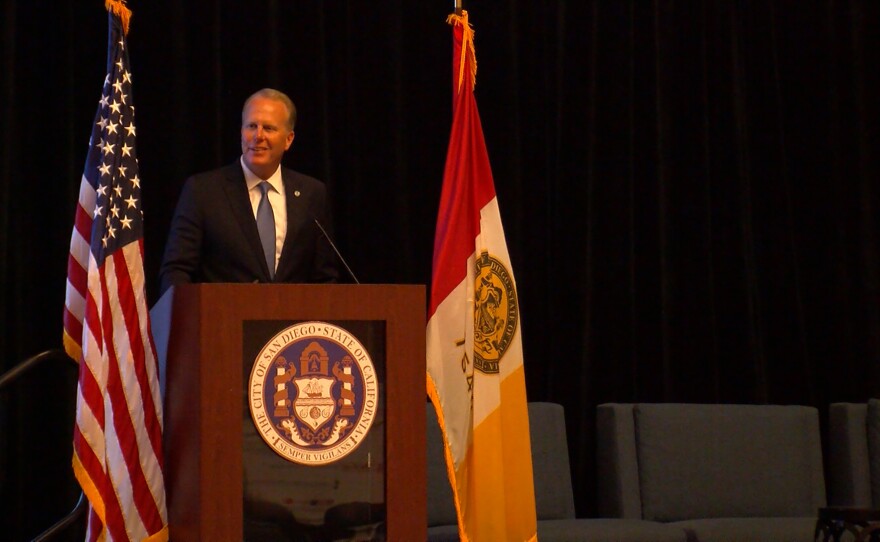President Trump's border wall is inching forward into reality, with construction on prototypes slated to launch this fall in San Diego.
On Thursday, the House approved a security spending bill that includes $1.6 billion for the wall. Meanwhile, the mayors of nearly 20 U.S. and Mexican border towns signed a resolution in San Diego to support international trade and cross-border collaboration on issues like ports of entry infrastructure.
The resolution was signed at the sixth annual Binational Summit of U.S.-Mexico Border Mayors Association, hosted by San Diego Mayor Kevin Faulconer.
RELATED: Contractor Appeals Delay Border Wall Prototypes
In an interview with KPBS, Faulconer said the U.S. should focus on building bridges rather than barriers with Mexico. He said policymakers in Washington D.C. are unaware of the economic benefits of cross-border ties and that he wants border mayors to unite in conveying that message to the federal government.
What follows is a transcript of a portion of that interview.
Q: In your view, why is the administration launching the border wall here, in an area that already has a fence? Is it going to make a real difference?
A: You know, it’s hard for me to answer that question. You’ll have to ask the federal partners. But one of the things that we are stressing here in San Diego is, we’re talking about bridges that unite us; the fact that we’re increasing our infrastructure; the fact that literally the cross-border bridge is just an example. Our relationship with our friends in Tijuana, our relationship with Mexico is a strength of ours. And that is why this conference is so important for us, important for me – to get mayors on both sides of the border, so as Washington is talking about policies and in particular potentially re-negotiating NAFTA, that we talk about how important free trade is, and why that’s a benefit to both of our cities.
Q: You talk about building bridges instead of walls. I wonder what this means given the national context. Would you – is it fair to say that the mission you have with Tijuana is in opposition to the President’s?
A: Our mission with Tijuana, our mission with all of the border mayors, is to show what unites us, to show our strengths and particularly how trade and free trade helps our cities. And something that I said earlier today as we kicked off the conference is, if we’re not telling our story of success, nobody’s going to tell it for us. And so as these discussions take place in Washington DC and you deal with representatives whose districts and states are thousands of miles away from the border, I think it’s very important for us as border mayors to talk, to be leaders, to lead that conversation. Because our economy is at stake. The good quality jobs. Mexico is our number one trading partner in San Diego. We’ve seen that increase in trade threefold since NAFTA started. We want to grow that. We want to strengthen that. And that’s why it’s important for us as border mayors to speak up.
Q: As you say, San Diego and Tijuana’s economies are very entwined and you have these integrated supply chains in aerospace and medical devices. You’re saying these things have been great for the economy of the region. What do you say to the criticism that American jobs are being exported to Mexico?
A: We say that free trade is a success and we’ve seen the job growth that has happened in San Diego. The fact that since NAFTA was done, our trade has increased threefold. The number of jobs that we’ve added, thousands of jobs that we’ve added. The fact that Mexico is our number one trading partner in San Diego. Again we have a success story, we have data and numbers that back that up.
Q: Do you think that your voices aren’t being heard currently at a national level?
A: I think we need to speak louder, we need to speak more united. That’s why I’ve hosted this conference in San Diego. I intend to be very active along with some of our other mayors to be leaders on this issue. Good jobs in San Diego, our economy is literally at stake with some of these decisions that are going to be made in Washington.







